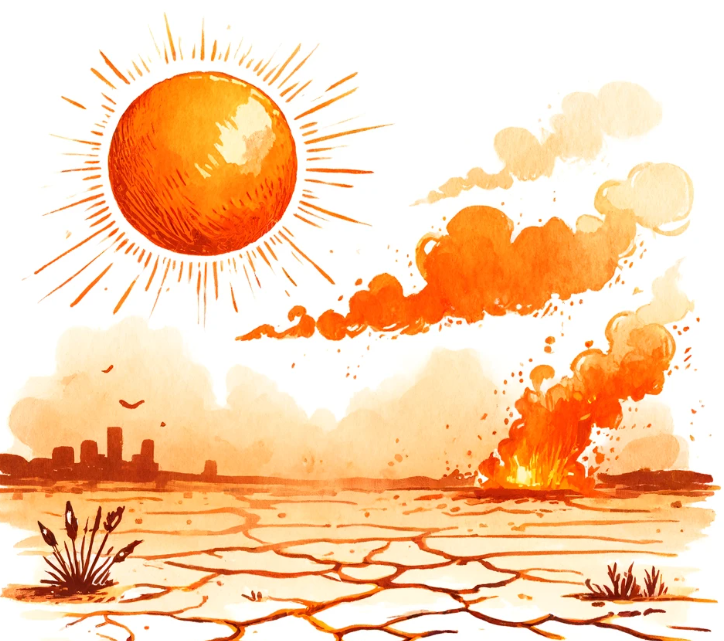
Staying Safe in Heat Wave
Imagine waking up one summer morning to find the temperature soaring (like, I don’t know, today). By noon, it’s unbearably hot, and by evening, the heatwave has claimed lives. This scenario is becoming increasingly common. In 2003, Europe experienced a heatwave that resulted in 70,000 excess deaths. As climate change progresses, heatwaves are expected to become more frequent and severe. Understanding who is most at risk and how to protect them can save lives. The information in this article is a bit old (2007), but still super relevant.
Why Are Heat Waves Deadly?
Heatwaves are periods of excessively high temperatures that last for days or even weeks. The human body struggles to cool down when it’s extremely hot, leading to heat-related illnesses and, in severe cases, death. Factors like age, health conditions, and living situations can increase the risk of death during heatwaves.
Who is Most at Risk?
Researchers analyzed data from several heatwaves to identify who is most at risk and what protective measures are effective. The findings are crucial for creating strategies to protect vulnerable populations.
- People Confined to Bed: Those who are bedridden face the highest risk during heatwaves. They have six times higher odds of dying compared to those who are mobile. Limited mobility makes it harder for their bodies to regulate temperature, and they may not be able to seek cooler environments or stay hydrated.
- Lack of Daily Outdoor Activity: People who do not leave their homes daily have over three times higher odds of dying during a heatwave. Staying indoors without air conditioning can trap heat, making it even more dangerous.
- Inability to Care for Oneself: Individuals unable to care for themselves are nearly three times more likely to die during a heatwave. They may struggle to drink enough water, cool down, or recognize the signs of heat-related illnesses.
- Preexisting Health Conditions: Mental health issues, cardiovascular diseases, and lung conditions significantly increase the risk. For example, people with psychiatric illnesses have over three times higher odds of dying during heatwaves.
Protective Measures: Simple Steps Can Save Lives
The study also identified effective protective measures. Here’s what can help:
- Air Conditioning: The most effective protection is having working air conditioning. It reduces the risk of dying by about 77%. If you don’t have air conditioning at home, spending a few hours a day in air-conditioned public places like libraries or shopping malls can be lifesaving.
- Social Interaction: Increasing social contact and checking in on each other is critical. People who stay socially connected during heatwaves have a 60% lower risk of dying. Community programs that regularly check on vulnerable individuals can make a significant difference.
- Staying Cool: Taking extra showers or baths and using fans can help. While the study found that using fans had a trend towards lower risk, it’s important to use them correctly. Fans should be used in a way that increases evaporation and cools the skin, not just blows hot air around.
Why Should We Care?
Heatwaves don’t just affect those at immediate risk; they impact entire communities. When vulnerable individuals die, it affects families, friends, and neighbors. Knowing who is at risk and how to protect them helps build a more resilient community. Moreover, as heatwaves become more common due to climate change, preparing now can prevent future tragedies.
How Can We Help?
- Check on Vulnerable Neighbors: Make it a habit to check on elderly or bedridden neighbors during heatwaves. Ensure they have access to cool environments and stay hydrated.
- Promote Air Conditioning: Advocate for policies that provide air conditioning to vulnerable populations. Community centers should be equipped as cooling centers during extreme heat.
- Educate About Heat Risks: Spread awareness about the dangers of heatwaves and the importance of staying cool and hydrated. Education can empower people to take necessary precautions.
Let us know your thoughts!
- Have you or someone you know been affected by a heatwave? How did you cope with the extreme heat?
- What community measures do you think could be effective in protecting vulnerable populations during heatwaves?
Conclusion: Preparing for the Future
Heatwaves are a growing threat that requires immediate action. By understanding who is at risk and implementing simple protective measures, we can save lives. It’s not just about surviving the next heatwave, but about building a future where everyone can stay safe and healthy, no matter how high the temperature rises.
Be a Health Innovator – Get Weekly Updates!
Stay informed and active. Subscribe for free and share this blog to make a difference in public health.
About the Author
Dr. Jonathan P. Scaccia, PhD, is a clinical-community psychologist with expertise in public health science and practice. He has led evaluation and research initiatives focusing on health equity, vaccine distribution, and organizational readiness. Dr. Scaccia has contributed to federal suicide prevention programs and vaccine equity strategies. He has been recognized with awards for his impactful work and is a leading voice in advancing public health practices.



